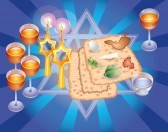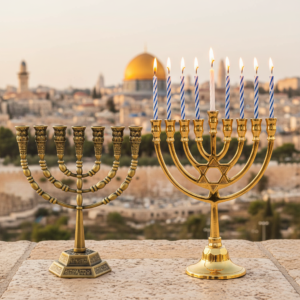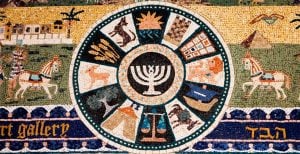 1. When does Passover begin and how long does it last?
1. When does Passover begin and how long does it last?
Passover begins on the 15th of Nissan of the Hebrew calendar and lasts for 7 days in Israel and 8 days everywhere else. Why? In the times of the Holy Temple, the Sanhedrin actually determined the beginning of the month based on the timing of the new moon. This information often did not reach the Diaspora communities until many days later, and they would celebrate the Passover for two days out of doubt. Eventually the dates became fixed based on scientific calculation but the custom remained.
2. What does “Passover” mean?
The specific “passing over” for which the holiday is named refers to the way in which the angle of death “passed over” the homes of the ancient Israelites during the night of the final plague in Egypt, when the Egyptian first born all died, and starting the Exodus from slavery and the journey to freedom.
3. What’s a “Passover Seder”?
The Seder, Hebrew for “order”, is the central ritual of Passover. It refers to the ceremony which invites all those in attendance to personally experience the Exodus through food, story, song, and conversation as guided through by the Haggadah.
4. What do the 4 cups of wine represent?
G-d uses four expressions of redemption in describing the Exodus from Egypt and Israel’s birth as a nation: “I will take you out…,” “I will save you…” “I will redeem you…,” and “I will take you as a nation…”
The Jewish sages instituted that we should drink a cup of wine for each one of these expressions.
5) Is Matzah the bread of affliction or redemption?
Actually, both! According to some opinions, matzah, unleavened bread, was the food that the slaves ate in Egypt. So, we eat the matzah at the Seder to remind us of the slavery. At the same time, when our forefathers left Egypt, they were in such a hurry that there was no time to wait for the dough to rise, so each year, to also remember the redemption, we eat matzah. Both reasons are implied in the Torah’s commandment, “Matzot shall you eat…”( Devarim 16:3).”
6) Why do bitter herbs have to do with freedom?
To fully appreciate freedom, one needs to fist have experienced the lack there of. On this night of freedom, these bitter herbs (horseradish or Romaine lettuce) are first eaten as a further reminder us of the bitterness of the slavery of our forefathers in Egypt.
7) What exactly is the Cup of Elijah?
Towards the conclusion of the Passover Seder, there is a universally accepted custom to now pour a 5th cup of wine, the “Cup of Elijah,” as we open the front door of the home. The fifth cup corresponds to the fifth expression of redemption, which comes in the following verse: “I will bring you to the Land . . .” This expression, however, is an allusion to the future messianic redemption, which will be announced by Elijah. This is also why we do not drink the fifth cup—as we have not yet experienced this redemption.
Next Year in Jerusalem!












